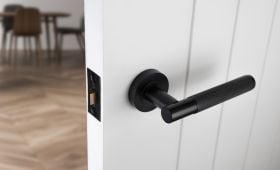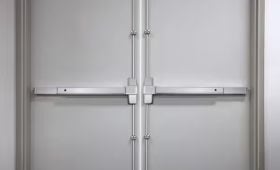
Smart Locks – The Future of Ironmongery?
17 February 2026Ironmongery is steeped in tradition - crafted hinges, solid mortice locks and heritage handles form the backbone of British architectural hardware. But as homes and businesses embrace digital transformation, this centuries-old trade is experiencing a technological shift. Smart locks are a modern solution that is reshaping how we think about security, convenience and access control.
Smart locks are becoming an increasingly common fixture on UK front doors, apartment blocks and office entrances. For homeowners, landlords and trade professionals, understanding this evolution is crucial.
In this article, we explore how smart locks are redefining the future of ironmongery, what this means for traditional hardware and how to balance innovation with security. This article will help you stay one step ahead.
What Are Smart Locks?
Smart locks are electronic locking devices that can either replace or enhance traditional locks. Instead of relying solely on a manual key, they can be unlocked using a PIN code, bluetooth, smartphone apps, Wi-Fi or even a fingerprint.
Unlike conventional locks, smart locks can allow for remote access, temporary digital keys, and activity tracking. Some models work independently, while others are part of a broader smart home ecosystem. For those looking to update existing doors, retrofit models like the Ultion Nuki offer a smart solution without the need to completely replace the current hardware.
How Smart Locks Are Changing the Ironmongery Landscape
The shift towards smart door hardware is due to broader changes in how people secure and access their homes and businesses. Smart locks bring a new layer of convenience: doors can be unlocked remotely for deliveries, tradespeople or guests, and access permissions can be changed instantly - no need for changing the locks or getting new keys cut.
For Ironmongery suppliers, this shift means adapting to an expanding product category. Handles, escutcheons and lock cases now need to be compatible with smart components, while traditional products are increasingly paired with digital accessories. There is an opportunity here to blend style with tech, offering options that don’t compromise aesthetics or security.
Fitters and ironmongery professionals play a crucial role in this transition. Their expertise ensures smart locks are correctly installed, fully integrated with existing door hardware, and compliant with security standards.
Pros and Cons of Smart Locks
Smart locks offer some clear pros: enhanced access control, no need for physical keys, and integration with smart home automation. They are especially popular with landlords who manage multiple properties or Airbnbs, or families who want to give temporary access to workmen or relatives.
However, they also have some cons: they can be more expensive upfront compared to traditional locks, some smart locks rely on power or Wi-Fi and therefore will need a backup solution in case of power cuts. There are also concerns about hacking. That said, many modern smart locks meet rigorous UK security standards and are built with encryption features.
Are Smart Locks Secure?
Security is a critical factor in the adoption of smart locks. There are reputable options such as those from Yale, ERA and Ultion that are tested to meet British standards such as PAS 23 and TS007. Many smart locks on offer today feature tamper detection, automatic locking and end-to-end encryption.
Battery life is another key concern, but most smart locks send alerts before power runs too low, and they can be manually overridden in emergencies. When they are installed correctly and paired with quality door hardware, smart locks can be just as secure as their traditional counterparts.
Our resident expert locksmith at Ironmongery For You states ‘You should never attempt smart lock installation without a professional, they can pose a potential security risk when installed incorrectly, and we have the experience and expertise to ensure they are fully configured and compatible with existing devices’
Who Should Consider Smart Locks?
While you may think that smart locks are just for tech enthusiasts, they are actually ideal for a wide range of users, from busy homeowners who want keyless entry, landlords who manage remote tenant access, to businesses looking for more control over staff entry points. As smart technology becomes more and more accessible, even traditionalists are starting to see the benefits of upgrading.
How to Choose the Right Smart Lock
Choosing the right smart lock depends on your door type, security requirements and how you plan to use it. Some models are designed for specific use with timber doors, while others are better suited to uPVS or composite setups. Its also worth considering factors like insurance compliance, compatibility with existing door furniture, and whether you want integration with other smart devices.
If you’re not ready to commit to a full digital system, retrofit options such as internal modules that sit over a traditional cylinder offer a less invasive way to introduce smart functionality.
If you’re exploring a smart lock for your property, our team at Ironmongery For You is always happy to help advise on the mechanical components that will best support it.
The Future of Ironmongery: What’s Next?
As technology continues to evolve, smart locks are likely to become standard in new builds and renovations. Voice control, AI access management and energy efficient components may soon redefine what we expect from door hardware. But traditional ironmongery won’t disappear, it will adapt. The future lies in striking a balance between craftmanship, compliance and convenience.
Final Thoughts
Smart locks represent more than a passing trend - they mark a significant shift in how we think about access and security. Whether you’re a homeowner upgrading to keyless, or a specifier exploring modern locking solutions, smart locks are increasingly worth your attention.
At Ironmongery For You, we believe in providing hardware that moves with the times, without compromising on quality. If you’re considering a smart lock for your property, our team is here to help you make the right choice.
Smart Lock FAQs
Are smart locks suitable for rented properties?
Yes, smart locks are ideal for landlords and Airbnb hosts. They allow remote access, easy rekeying between tenants, and tracking of entry history, helping to improve both convenience and security.
Can smart locks be hacked?
While no device is completely immune to hacking, reputable brands like Yale, ERA and Ultion use advanced encryption and comply with UK security standards. Always choose locks certified to PAS 24 or TS007.
Do smart locks work without Wi-Fi?
Some smart locks operate via Bluetooth or offline codes, but others rely on Wi-Fi for full functionality. Always check whether a backup entry method is available in case of connectivity issues.
How much do smart locks cost?
Prices vary based on features and brand, but generally range from £100 to £300. Retrofit models can help reduce installation costs.
Do I need a professional to install a smart lock?
Yes, installation by a qualified locksmith or fitter is recommended to ensure compatibility with existing hardware and to avoid potential security risks.








